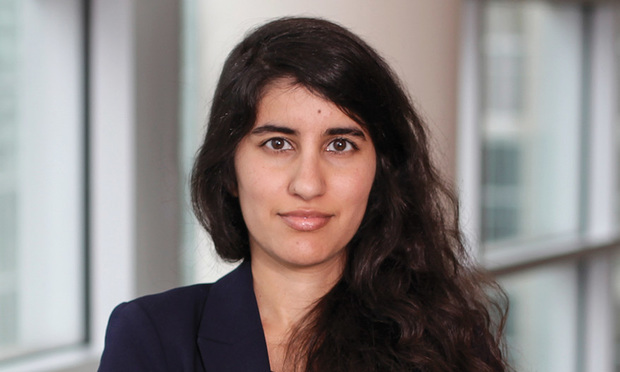Daily Dicta: Meet the Orrick Associate Who Just Won a Major En Banc 9th Circuit Decision
When Orrick associate Easha Anand walked into the Ninth Circuit's San Francisco courthouse on March 27, she admitted she was terrified, but said she was confident she had the better of the facts and the law.
July 11, 2019 at 12:23 PM
6 minute read
 Easha Anand, managing associate with Orrick Herrington & Sutcliffe.
Easha Anand, managing associate with Orrick Herrington & Sutcliffe.
Here's a name to remember: Easha Anand.
The Orrick, Herrington & Sutcliffe associate is among the next generation of lawyers to watch as a future leader of the profession.
Less than three years after she joined Orrick following a clerkship for Justice Sonia Sotomayor, Anand just won her first oral argument—an against-the-odds victory before en banc panel at the U.S. Court of Appeals for the Ninth Circuit.
Kudos to Orrick and supervising partner Melanie Bostwick for letting an associate play the starring role in a rare en banc proceeding.
Then again, Anand was the one who landed the pro bono representation, who convinced the Ninth Circuit to re-hear the case—and ultimately, to get nine of 11 judges to side with her in finding both the district court and three-judge panel got it wrong in imposing a sentence of life without parole on a juvenile offender.
“Orrick put every resource of the firm behind me,” Anand said, adding that she did five moot court arguments with partners and associates to prepare.
When she walked into the Ninth Circuit's San Francisco courthouse on March 27, she admitted she was “terrified,” but said she was confident she had “the better of the facts and the law.”
Anand represented Riley Briones Jr., who age 17 was the getaway driver in a robbery that resulted in a murder.
Abused by his father as child growing up on the Salt River Indian Reservation in Arizona, Briones was drinking and using drugs by age 11, according to court papers. Along with his father and brother, he founded a gang called the Eastside Crips Rolling 30's.
In 1994, his brother came up with the idea to rob a Subway restaurant, and Briones went along with the plan. One of the gang members shot and killed the lone Subway worker while Briones waited in the car.
When Briones was arrested, he was also charged with other unrelated crimes including arson, assault, and witness tampering. Before trial, he was offered a 20-year sentence, but his father was “adamant” that neither he nor his sons should accept the deal.
Instead, Briones in 1997 got life in prison without parole. (His father is slated for release in 2022—how's that for unfair?)
For the next 15 years, that was it. With seemingly no hope of ever going free, he was nonetheless a model inmate, without a single infraction of prison rules. He completed his GED, he spoke to young inmates about how to change their lives, he married the woman he dated in high school and who is the mother of his child. He expressed grief and regret for his crimes.
And then, in 2012, the Supreme Court in Miller v. Alabama held that mandatory LWOP sentences for juvenile offenders violate the Eighth Amendment's prohibition on cruel and unusual punishment.
Four years later, the high court followed up with Montgomery v. Louisiana, which specified that a sentence of life without the possibility of parole is constitutionally permissible only for “the rarest of juvenile offenders”—specifically, those whose “crimes reflect permanent incorrigibility” and “irreparable corruption.”
Briones filed a motion for resentencing. But U.S. District Judge Douglas Rayes in Arizona sentenced him in 2016 once again to life in prison without parole.
On May of 2018, a three-judge panel at the Ninth Circuit upheld the sentence. The panel noted that Briones was just barely a juvenile at the time of the murder—age 17 years and 11 months—and that he went on to commit more violent crimes for the next year and a half prior to his arrest.
“The gist of Briones's appeal is that the district court failed to make an explicit finding that Briones was 'incorrigible,' that the district court failed to adequately consider the 'hallmarks of youth' discussed in Miller, and that the district court did not adequately consider Briones's rehabilitation. We are not persuaded,” wrote Judge Johnnie Rawlinson, who was appointed by President Bill Clinton.
When Anand saw the panel's decision, she was shocked. “I couldn't believe this case. The decision was so clearly wrong,” she said.
Before she went to law school at Berkeley, Anand worked as a mitigation investigator for defendants on California's death row, and she immediately began discussing the case with others in the criminal defense community.
Her texts “hit the right place at the right time,” and she was recruited to team up with Arizona-based defense counsel Vikki Liles to petition for rehearing en banc.
A former law clerk to Ninth Circuit Judge Paul Watford, Anand knew the appellate court. And when the Supreme Court decided Montgomery v. Louisiana, she was clerking for Sotomayor.
“The panel majority erred in two respects, each of which has dire consequences for defendants sentenced to life for crimes they committed as children,” Anand wrote in the petition for rehearing. “The sentencer who considers the hallmarks of youth must still ascertain whether the child is 'permanent[ly] incorrigib[le].”
“Second,” she continued, “the district court erred in treating this case like an ordinary Sentencing Guidelines case when the Eighth Amendment requires a different analysis. The Constitution creates a strong presumption against a life sentence for juvenile offenders.”
Her arguments carried the day with nine members of the en banc panel, including Trump appointee Ryan Nelson and George W. Bush appointee Milan Smith. (Judges Mark Bennett and Sandra Ikuta dissented.)
“The district court's heavy emphasis on the nature of Briones's crime, coupled with Briones's evidence that his is not one of those rare and uncommon cases for which LWOP is a constitutionally acceptable sentence, requires remand,” wrote Judge Morgan Christen for the en banc majority. “When a district court sentences a juvenile offender in a case in which an LWOP sentence is possible, the record must reflect that the court meaningfully engaged in Miller's central inquiry.”
The decision “is a big victory,” Anand said, “but there's still a long way to go. The real celebration will be when Mr. Briones walks free.”
This content has been archived. It is available through our partners, LexisNexis® and Bloomberg Law.
To view this content, please continue to their sites.
Not a Lexis Subscriber?
Subscribe Now
Not a Bloomberg Law Subscriber?
Subscribe Now
NOT FOR REPRINT
© 2025 ALM Global, LLC, All Rights Reserved. Request academic re-use from www.copyright.com. All other uses, submit a request to [email protected]. For more information visit Asset & Logo Licensing.
You Might Like
View All
Firms Come Out of the Gate With High-Profile Litigation Hires in 2025

2024 Marked Growth On Top of Growth for Law Firm Litigation Practices. Is a Cooldown in the Offing for 2025?

Big Company Insiders See Technology-Related Disputes Teed Up for 2025

Litigation Leaders: Jason Leckerman of Ballard Spahr on Growing the Department by a Third Via Merger with Lane Powell
Trending Stories
- 1Former NY City Hall Official Tied to Adams Corruption Probe to Plead Guilty
- 2Wilmer, White & Case, Crowell Among the Latest to Add DC Lateral Partners
- 3Advance Auto Parts Hires GC Who Climbed From Bottom to Top of Lowe's Legal Department
- 4Judge Rules Georgia Railroad Can Seize Land as Landowners Vow to Fight
- 5On the Move and After Hours: Einhorn Barbarito; Gibbons; Greenbaum Rowe; Pro Bono Partnership
Who Got The Work
J. Brugh Lower of Gibbons has entered an appearance for industrial equipment supplier Devco Corporation in a pending trademark infringement lawsuit. The suit, accusing the defendant of selling knock-off Graco products, was filed Dec. 18 in New Jersey District Court by Rivkin Radler on behalf of Graco Inc. and Graco Minnesota. The case, assigned to U.S. District Judge Zahid N. Quraishi, is 3:24-cv-11294, Graco Inc. et al v. Devco Corporation.
Who Got The Work
Rebecca Maller-Stein and Kent A. Yalowitz of Arnold & Porter Kaye Scholer have entered their appearances for Hanaco Venture Capital and its executives, Lior Prosor and David Frankel, in a pending securities lawsuit. The action, filed on Dec. 24 in New York Southern District Court by Zell, Aron & Co. on behalf of Goldeneye Advisors, accuses the defendants of negligently and fraudulently managing the plaintiff's $1 million investment. The case, assigned to U.S. District Judge Vernon S. Broderick, is 1:24-cv-09918, Goldeneye Advisors, LLC v. Hanaco Venture Capital, Ltd. et al.
Who Got The Work
Attorneys from A&O Shearman has stepped in as defense counsel for Toronto-Dominion Bank and other defendants in a pending securities class action. The suit, filed Dec. 11 in New York Southern District Court by Bleichmar Fonti & Auld, accuses the defendants of concealing the bank's 'pervasive' deficiencies in regards to its compliance with the Bank Secrecy Act and the quality of its anti-money laundering controls. The case, assigned to U.S. District Judge Arun Subramanian, is 1:24-cv-09445, Gonzalez v. The Toronto-Dominion Bank et al.
Who Got The Work
Crown Castle International, a Pennsylvania company providing shared communications infrastructure, has turned to Luke D. Wolf of Gordon Rees Scully Mansukhani to fend off a pending breach-of-contract lawsuit. The court action, filed Nov. 25 in Michigan Eastern District Court by Hooper Hathaway PC on behalf of The Town Residences LLC, accuses Crown Castle of failing to transfer approximately $30,000 in utility payments from T-Mobile in breach of a roof-top lease and assignment agreement. The case, assigned to U.S. District Judge Susan K. Declercq, is 2:24-cv-13131, The Town Residences LLC v. T-Mobile US, Inc. et al.
Who Got The Work
Wilfred P. Coronato and Daniel M. Schwartz of McCarter & English have stepped in as defense counsel to Electrolux Home Products Inc. in a pending product liability lawsuit. The court action, filed Nov. 26 in New York Eastern District Court by Poulos Lopiccolo PC and Nagel Rice LLP on behalf of David Stern, alleges that the defendant's refrigerators’ drawers and shelving repeatedly break and fall apart within months after purchase. The case, assigned to U.S. District Judge Joan M. Azrack, is 2:24-cv-08204, Stern v. Electrolux Home Products, Inc.
Featured Firms
Law Offices of Gary Martin Hays & Associates, P.C.
(470) 294-1674
Law Offices of Mark E. Salomone
(857) 444-6468
Smith & Hassler
(713) 739-1250






